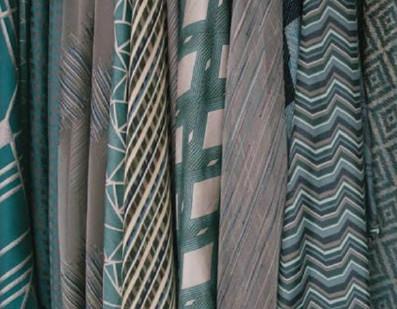 There have been problems in the supply chain of the textile industry
There have been problems in the supply chain of the textile industry
The effects of the coronavirus were also reflected in the supply chain. in this process, where business life stopped and production reached a zero point, some problems occurred in the supply chain of the textile industry. While the coronavirus outbreak caused consumer demand to drop in many areas, existing textile orders were suspended, postponed, or canceled, The effect of this move, which left the manufacturers in a difficult situation, doubled with the logistics problems that arose. The closure of the borders of many countries to prevent the pandemic disrupted global trade. This development, which was reflected as an increase in the delivery times and costs of the products, brought commercial activities to a halt. The first virus case in Turkey, which was supposed to be one step ahead when the virus emerged in China, on March 11 disrupted trade balance in the country.
The increasing number of cases in Europe, which is also supplied by Turkey, resulted in the target countries falling behind the momentum of global trade. While many retail stores were closed due to the pandemic, the textile industry turned towards e commerce. However, the increasing volume of e commerce remained behind the turnovers obtained in physical stores. These negative developments in the supply chain and customer habits also affected many Asian countries whose economy was heavily dependent on textiles. The importance of textile, the locomotive industry of Turkey, has been revealed once again The Turkish textile enterprises, which have reduced their capacity or stopped operating, have taken action in the field of manufacturing masks and protective clothing, which have become an essential need in the field of health. The major brands of the Turkish textile industry have come to the fore in the manufacturing of masks and protective clothing, taking advantage of the country’s strong raw material capacity. The export of home e textile industry has adversely been affected by COVID.
According to the data of the General Secretariat, the export of home textiles decreased by 13.2 percent in the January July period of 2020 and reached 904 million dollars. in this period, the export volume of the bed sheet group, which constitutes 31.6 percent.
 According to the report, the coronavirus is expected to reduce China’s home textile exports by 10 percent in the first quarter and 7 percent in the second quarter. The other assumptions included in the report are that home textile exports in the country will increase by 1.5percent, instead of 6 percent throughout the year and that China will lose nearly 2.2 billion dollars in home textile exports throughout 2020.
According to the report, the coronavirus is expected to reduce China’s home textile exports by 10 percent in the first quarter and 7 percent in the second quarter. The other assumptions included in the report are that home textile exports in the country will increase by 1.5percent, instead of 6 percent throughout the year and that China will lose nearly 2.2 billion dollars in home textile exports throughout 2020.
The total home textile export was 286 million dollars. The export volume of towel and cleaning cloth, another important product group in the industry, was 285 million dollars. When the exports in the same period are analyzed on the basis of countries, it is seen that the most important country is Germany, whose export volume was 214 million dollars. Germany was followed by the USA, France, Italy, and the Netherlands. It is remarkable that the export of Turkey to EU countries, which constitute 59.9 percent of Turkey’s total exports of home textiles, decreased by 12 percent during this period.
 The amount of the Stability Shield has exceeded 260 billion TL Over 2 billion TI was donated to the national solidarity campaign called “Biz Bize Yeteriz Turkiyem”, which was launched on March 30. Treasury and Finance Minister Mr. Bend Albayrak stated that the amount of the Economic Stability Shield Package exceeded 260 billion TL and this figure indicates 5 percent of the national income. Stating that the figure has reached 600 billion TL with the multiplier effect, Minister Albayrak stated that 6.6 million citizens were provided basic need support of 39.1 billion TL and the total support offered to the tradesmen reached 26.1billion TL. Within the scope of the business continuity loan, 192 thousand 645 firms were allocated 151.7 billion TL. With the support of short term employment allowance, unemployment allowance and cash wage support, a budget of 6 billion TL was allocated for over 4.5 million people. Treasury and Ministry of Finance announced that Turkey was dissociated from the EU, G 20, and OECD countries in a positive sense and completed the first quarter of the year with a growth of 4.5 percent.
The amount of the Stability Shield has exceeded 260 billion TL Over 2 billion TI was donated to the national solidarity campaign called “Biz Bize Yeteriz Turkiyem”, which was launched on March 30. Treasury and Finance Minister Mr. Bend Albayrak stated that the amount of the Economic Stability Shield Package exceeded 260 billion TL and this figure indicates 5 percent of the national income. Stating that the figure has reached 600 billion TL with the multiplier effect, Minister Albayrak stated that 6.6 million citizens were provided basic need support of 39.1 billion TL and the total support offered to the tradesmen reached 26.1billion TL. Within the scope of the business continuity loan, 192 thousand 645 firms were allocated 151.7 billion TL. With the support of short term employment allowance, unemployment allowance and cash wage support, a budget of 6 billion TL was allocated for over 4.5 million people. Treasury and Ministry of Finance announced that Turkey was dissociated from the EU, G 20, and OECD countries in a positive sense and completed the first quarter of the year with a growth of 4.5 percent.
Turkish Home Textile Association (TETSIAD) has researched the effects of the pandemic on home textile exports. TETSIAD published a report titled The Effects of the corona virus on Home Textile Exports in February, when the coronavirus had not been seen in Turkey and the pandemic had not been declared yet. According to the report, China, which was the second largest economy in the world with an economy of 14.1 trillion dollars in 2019, was the world’s largest economy according to the purchasing power parity. The global export share of the country, which exported 2.4 trillion dollars at the end of 2019, was 13.2 percent.
The pandemic spread rapidly in the city of Wuhan and throughout the country, where quarantine practices began in January. While countries closed their borders to China in this process, the number of countries where the virus was seen started to increase. While the Chinese government was implementing quarantine practices and strict measures, it also took some measures to prevent its economy from being affected by the current situation. It was noteworthy that the country announced in the first half of 2020 that it would not announce its growth target, which it has announced every year since 1990. It is known that unemployment rate in China reached 6 percent and retail sales decreased by 7.5 percent in April, compared to the previous year It is thought that Chinese citizens tend to keep their expenditures under control with concern for the second wave. The factories and workplaces that were closed due to quarantine caused China, which is the most important actor of the global supply chain in the field of production and export, to enter a stable process.
 China, the leader of home textile exports According to the report, while home textile exports worldwide were 98.7 billion dollars in 2018, this figure is estimated to exceed 102 billion dollars in 2019. While 51percent of home textile exports were carried out by China in 2018, Turkey’s share in total home textile exports was recorded as 3.3 percent. The countries that follow China, the pioneer of global home textile exports, are India, Pakistan, and Taiwan, respectively. Turkey is the fifth country where the global home textile export is highest. Turkey is followed by South Korea, Germany, Italy, Japan, and the United Slates. The country where China exports the most home textiles is the USA, which makes 20 percent of the total home textiles imports. China carried out about a fifth of total home textile exports to the USA. The countries that China makes the most export after the USA in the field of home textile are Vietnam, Japan, Indonesia, and Germany. The Turkish home textile industry, which exported home textiles of 3.1 billion in 2019, is expected to increase its export volume after the pandemic in China. The opinion that Turkey will come one step forward with its high quality and fast production as an alternative to China, where existing production activities stopped and goods and service sector lost confidence, was started to be defended in the early days of the pandemic.
China, the leader of home textile exports According to the report, while home textile exports worldwide were 98.7 billion dollars in 2018, this figure is estimated to exceed 102 billion dollars in 2019. While 51percent of home textile exports were carried out by China in 2018, Turkey’s share in total home textile exports was recorded as 3.3 percent. The countries that follow China, the pioneer of global home textile exports, are India, Pakistan, and Taiwan, respectively. Turkey is the fifth country where the global home textile export is highest. Turkey is followed by South Korea, Germany, Italy, Japan, and the United Slates. The country where China exports the most home textiles is the USA, which makes 20 percent of the total home textiles imports. China carried out about a fifth of total home textile exports to the USA. The countries that China makes the most export after the USA in the field of home textile are Vietnam, Japan, Indonesia, and Germany. The Turkish home textile industry, which exported home textiles of 3.1 billion in 2019, is expected to increase its export volume after the pandemic in China. The opinion that Turkey will come one step forward with its high quality and fast production as an alternative to China, where existing production activities stopped and goods and service sector lost confidence, was started to be defended in the early days of the pandemic.
Focusing on home textile exports in the EU countries, Turkey performs 14.5 percent of its exports to Germany and 9.2 percent of it to the United States. Other countries which come to the fore in Turkey’s home textile exports are the United Kingdom, Italy, Bulgaria, France, and the Netherlands. Although their target markets were different, it was estimated that the decline in the demand for China would be reflected as the increase in the demand for Turkey, yet the fact that the virus has had very devastating impacts in Europe has shown that this assumption will not come true in the short term. Turkey ranks among the top 3 countries that the EU countries and the US will make imports from, rather than Chinese.
Turkish Home Textile Association





